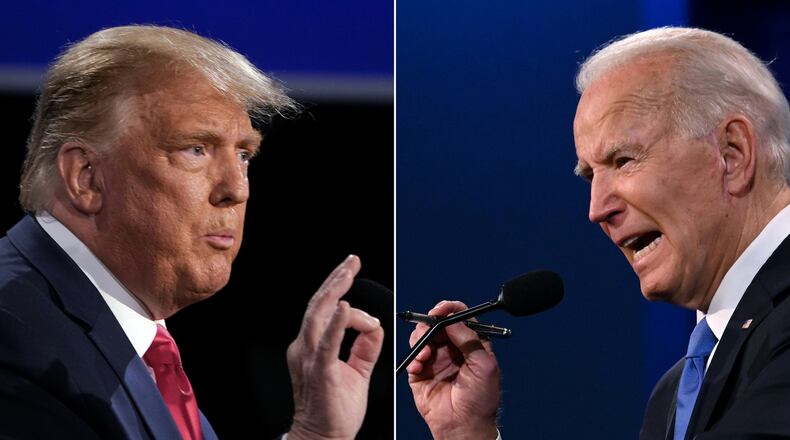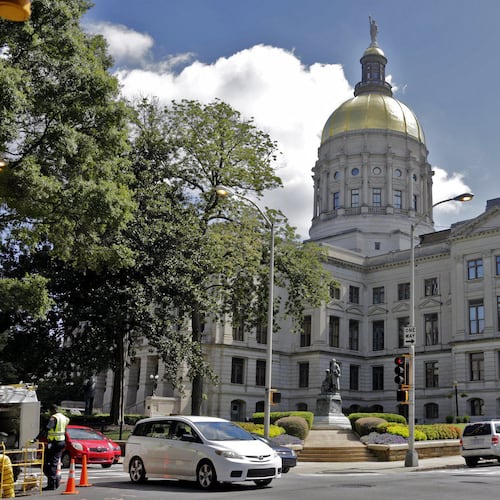Faceoff will be Atlanta’s first-ever presidential election showdown
Georgia, always expected to play a big role in this year’s campaign as one of the few swing states, will have the stage all to itself late next month when it hosts the first presidential debate.
Democratic President Joe Biden and former President Donald Trump, the GOP’s presumptive nominee, will face off June 27 in CNN’s Atlanta studios.
The two candidates hashed out an agreement through a series of social media posts, setting a format that includes no audience in the studio and offering no details about whether a third-party candidate, such as Robert F. Kennedy Jr., can participate.
CNN’s Jake Tapper and Dana Bash will serve as the moderators.
It will be the first general election presidential debate ever held in the state, although Atlanta has played host to primary debates and a showdown between vice presidential candidates in 1992.
Biden and Trump also agreed to a second debate Sept. 10 that ABC News will host.
The deal sidelines the bipartisan commission that has organized White House debates for decades. It had made plans for three debates in September and October, plus a faceoff between the vice presidential candidates.
Thousands of voter challenges expected ahead of November election
Gearing up for November’s presidential election, conservative activists are recruiting volunteers to help launch a plan seeking to disqualify voters who appear to have moved from Georgia.
Based on previous efforts, you can expect to see thousands of challenges, maybe hundreds of thousands.
Georgia saw 250,000 challenges to voters’ eligibility in 2020, followed by an additional 100,000-plus since then.
Most challenges have been dismissed by county election boards.
Activists in this newest drive will come armed with data from organizations such as EagleAI, a Columbia County startup company that uses publicly available information to attempt to identify people who have moved or registered to vote in another state.
The challenges also will be guided by an election law Gov. Brian Kemp signed this month setting criteria for local election boards to uphold or deny voter challenges. While change-of-address information can be considered by election officials weighing challenges, the new law requires that additional evidence be provided.
Stefan Bartelski recently challenged 801 registrations in Forsyth County. He’s now the state coordinator for EagleAI and said its users across Georgia plan to make “a good push” to file more voter challenges in the coming months.
“We always do our best to make sure that we’re not disenfranchising anyone, but mistakes happen occasionally,” Bartelski said. “I really believe we do a lot more cleanup than any harm.”
Critics of the EagleAI software say its information is unreliable because voters might have moved back to Georgia, or it could flag two different people with the same names and birth years, endangering their ability to vote.
Credit: Courtesy: Ross Rossin
Credit: Courtesy: Ross Rossin
Aaron’s likeness could replace that of Confederate leader at U.S. Capitol
Plans call for a statue at the U.S. Capitol of Confederate Vice President Alexander Stephens — known for saying slavery was the “natural and normal condition” of Black people — to be replaced by one honoring an African American man.
Republican state Rep. Trey Kelley of Cedartown has proposed removing Stephens’ statue to make way for a figure of Atlanta Braves great Hank Aaron, who broke Babe Ruth’s home run record.
“There’s nothing more American than baseball, and no one personifies American values more than Hank Aaron,” Kelley said, pointing out that Aaron’s accomplishment also include advancing civil rights.
There’s been a target on the Stephens statue for some time. Even his relatives have called for its removal.
The question has always been over who should take his place.
A bipartisan proposal to replace it with the likeness of the late U.S. Rep. John Lewis, the Democratic civil rights leader, failed to gain traction despite support from Gov. Brian Kemp, then-House Speaker David Ralston and then-Lt. Gov. Geoff Duncan.
Another proposal once sought to honor the Rev. Martin Luther King Jr.
Kelley’s plan will require the approval of the General Assembly, which will not reconvene until January.
Credit: Jamie Spaar
Credit: Jamie Spaar
Ossoff said support is building to help police, firefighters, teachers buy homes
U.S. Sen. Jon Ossoff announced that a bill that would offer police, firefighters and teachers federal help in buying their first homes now has the bipartisan support of 25 senators.
Ossoff introduced the bill in early 2023 with two co-sponsors, Democratic U.S. Sen. Sherrod Brown of Ohio and Republican U.S. Sen. Marco Rubio of Florida.
A companion bill was introduced in the House by Democratic U.S. Rep. Bonnie Watson Coleman of New Jersey and Republican U.S. Rep. John Rutherford of Florida.
Ossoff made the announcement during a news conference at the north precinct of the Henry County Sheriff’s Office in McDonough.
Henry is just one of many communities across the state and the nation that are struggling to fill vacancies in schools and police departments because applicants can’t afford housing near their jobs.
In Henry, for example, about half of the county government’s 1,800 employees live outside the county because they can’t afford housing, County Commissioner Kevin Lewis said.
“Having a stable teacher workforce, having a stable public safety workforce is essential to any community, especially if you want a healthy community,” Lewis said.
Out-of-state money plays outsized role in congressional race
A former aide in the Trump administration is running to represent a slice of west Georgia in Congress. If he wins, it will be because of donors from outside the state.
About 75% of the itemized donations to Brian Jack — contributions of $200 or more — have come from places other than Georgia. That amounts to more than $500,000.
By comparison, out-of-state donations accounted for less than one-third of the donations received by the other candidates in the race, according to an Atlanta Journal-Constitution analysis of the latest fundraising data by the Federal Election Commission.
In all, Jack has raised more than $900,000 to finance his campaign in Tuesday’s GOP primary in the 3rd Congressional District. That incudes small, unitemized donations and transfers from other political committees.
His closest contender in the race, in terms of money, is former state Sen. Mike Crane, who trails him by about $400,000.
Also running in Tuesday’s primary are Jim Bennett, a former police officer and retired information technology professional, former state Senate Majority Leader Mike Dugan and former state Rep. Philip Singleton.
Running on the Democratic side are a pair of U.S. Army veterans, Val Almonord and Maura Keller. After leaving active duty, Almonord spent most of his career as a doctor with the Military Health System. Keller works as a nuclear medicine technologist for the U.S. Department of Veterans Affairs in Atlanta.
Committee to study state’s licensing process for businesses
A bipartisan legislative committee will examine the difficulties businesses face in trying to renew and obtain licenses from the state.
State House Speaker Jon Burns and Lt. Gov. Burt Jones announced creation of the committee in a letter, saying it will focus on eliminating “unnecessary hurdles” in applying for licenses online.
“We have received numerous complaints from businesses across Georgia regarding substantial inefficiencies in renewing and obtaining the licenses and certifications necessary for their operation,” Burns said.
The secretary of state’s office, which includes a professional licensing division, welcomed the effort, spokesman Mike Hassinger said.
“The secretary of state’s office applauds the General Assembly for finally paying attention to removing red tape that slows down licenses and certifications for Georgia professionals and small businesses,” Hassinger said.
Secretary of State Brad Raffensperger and his GA Works Licensing Commission sought approval for several licensing bills during this year’s legislative session, but they all failed to pass.
The committee will complete its work before the end of the year, and then bills could be introduced during the 2025 legislative session that begins in January.
Political expedience
- Words and actions: Lt. Gov. Burt Jones joined a group of Republicans who slammed far-right state Sen. Colton Moore, R-Trenton, earlier this year after he hurled insults at the late David Ralston on a day the General Assembly chose to honor the former House speaker. That didn’t stop Jones from donating $500 to Moore, who faces Angela Pence in Tuesday’s GOP primary.
- Court overhaul: U.S. Rep. Hank Johnson of Lithonia joined other House Democrats in announcing the creation of a Court Reform Now Task Force that will advocate for ethics guidelines and term limits for U.S. Supreme Court justices.
- Voter guide: If you are looking for information about the candidates in Tuesday’s elections, Georgia Decides has you covered. The voter guide, which can be found at https://www.ajc.com/politics/voter-guide/georgia-decides-may-2024/, is a joint project from The Atlanta Journal-Constitution and The Atlanta Civic Circle.
About the Author
Keep Reading
The Latest
Featured






